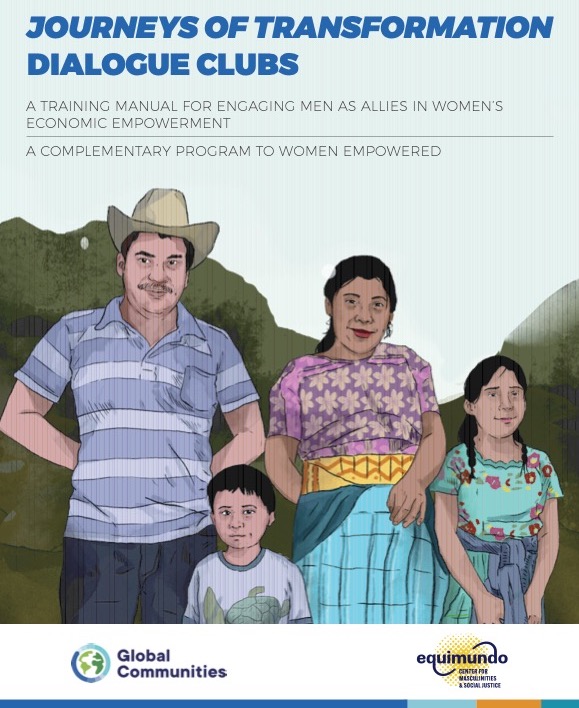The Journeys of Transformation (JoT) program was created and implemented in Rwanda by CARE Rwanda, RWAMREC, and Equimundo to engage men as allies in women’s economic empowerment. Through 2020 and 2021, Equimundo and Global Communities adapted JoT and evaluated its impact on rural and indigenous men and women in Guatemala. The adapted program, known in Spanish as Caminos a la Transformación (CaT), comprises 13 group learning and discussion sessions based on a curriculum that promotes men’s acceptance and support of their female partners’ economic empowerment by addressing gendered barriers to women’s economic empowerment. Results from the evaluation showed a positive shift in gender-related outcomes including increased support of more equitable gender roles, improved communication between partners, higher male participation in household tasks and childcare, increased support for women’s participation in saving groups and decision-making, as well as reduced acceptance of intimate partner violence.
It is increasingly recognized that women’s economic empowerment has multiplying positive effects for women, the family, and the community. Women’s economic empowerment is vital both to realize women’s rights and to achieve broader development goals such as economic growth, poverty reduction, health, education, and well-being. Many interventions have focused on reducing barriers to women ́s economic empowerment, such as facilitating access to financial services, employment and entrepreneurship for women, as well as programs to strengthen women’s financial knowledge and soft skills. Nonetheless, studies have found that restrictive gender norms and attitudes play an important role in women’s ability to participate in these interventions and ultimately engage and benefit from economic activities. Particularly, it is recognized that men play a key role in limiting women’s economic empowerment and some studies have found that programs which focus solely on women can increase intimate partner violence, although the evidence of the impact of economic interventions on intimate partner violence is mixed.
However, evidence also shows that when combined with economic empowerment interventions that focus on strengthening livelihoods for women, men and families, gender-transformative approaches that work with groups of men and women to facilitate critical reflection on gender roles, norms, and power relations between them favor women’s economic empowerment, more equitable relationships including the distribution of caregiving and domestic work, and have the potential to reduce intimate partner violence. As a result, there is increasing focus on complementing women’s economic empowerment interventions such as cash transfers, strengthening of business skills or savings groups with gender-transformative programs that engage women together with their male partners.
Learn more about Journeys of Transformation here.
Resources
English
Learning Brief 1: Program Summary
PDF PreviewLearning Brief 2: Key Outcome Evaluation Findings
PDF PreviewLearning Brief 3: Lessons on Recruiting and Retaining Men in Gender Transformative Programs
PDF PreviewTraining Manual
PDF PreviewSpanish
Learning Brief 1: Program Summary
PDF PreviewLearning Brief 2: Key Outcome Evaluation Findings
PDF PreviewLearning Brief 3: Lessons on Recruiting and Retaining Men in Gender Transformative Programs
PDF PreviewTraining Manual
PDF Preview